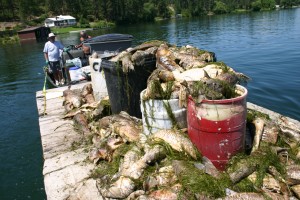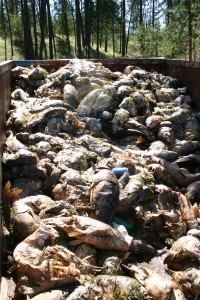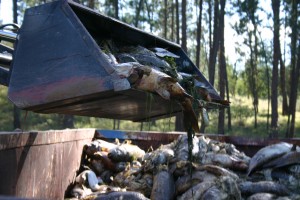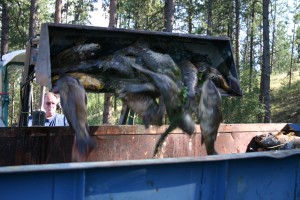Volunteers rally to remove dead carp from Lake Spokane
July 27, 2010
Forum Staff Report
Thousands of dead carp turned up in Lake Spokane the week of July 11. According to Washington Department of Fish and Wildlife (WDFW) district fish biologist Chris Donley, die-off may have occurred due to a combination of spawning stress, temperature fluctuations and a virus.
According to Ron Costa, who helped collect floating fish, “Carp were floating on the surface, even in the late stages of decomposition, with literally hand-fulls of maggots on each one.”
Tight budgets, however, kept state and local agencies sidelined for helping remove the carp. In response, local citizens and businesses rallied to remove thousands of smelly, decomposing fish from the lake.
Volunteer efforts resulted in 3 semi loads, or about 18,000 pounds of fish, being hauled off to the Barr-Tech composting facility in Lincoln County.
 Larry Guenther, Stevens County Commissioner, helped organize local government efforts to make the volunteer effort successful. Collection stations were set up at the West Shore Association Boat Launch, Lake Shore Community Park and the old Forshees Resort. Avista helped supplement volunteer efforts with a $2000 contribution for contract labor to collect floating fish.
Larry Guenther, Stevens County Commissioner, helped organize local government efforts to make the volunteer effort successful. Collection stations were set up at the West Shore Association Boat Launch, Lake Shore Community Park and the old Forshees Resort. Avista helped supplement volunteer efforts with a $2000 contribution for contract labor to collect floating fish.
In quite the innovative twist, Barr-Tech donated dumpsters and hauling trucks to take the fish to their organic waste recycling facility in Lincoln County. Says Guenther, “Tragic and smelly as the fish kill was, at least they were disposed in a way that can do some good.”
Larry Condon, general manager of Barr-Teck, described the composting process.
 “We blended (ground) the fish as much as we could, then mixed in saw dust and green waste. The fish remains were then lined up through the center of a compost pile. More compost was put on top to bury it. It’ll sit there for six weeks; we’ll rotate the pile and let it sit for another six weeks. By then we can resell it as organic fertilizer. That stuff has a great nitrogen value.”
“We blended (ground) the fish as much as we could, then mixed in saw dust and green waste. The fish remains were then lined up through the center of a compost pile. More compost was put on top to bury it. It’ll sit there for six weeks; we’ll rotate the pile and let it sit for another six weeks. By then we can resell it as organic fertilizer. That stuff has a great nitrogen value.”
“Since all the dead carp appear to be adult fish, it’s highly possible they came near shore to spawn when it was cool a few weeks ago, waited around for the warmer water temperatures they prefer, then were stressed with very elevated water temperatures very quickly, and became susceptible to natural pathogens like bacteria or viruses,” Donley explained. “Things like this happen more often than most people realize, usually with fish carcasses either sinking to lake bottoms or decomposing in remote areas where no one sees them.”
According to Guenther “It’s looking a lot better now.”



